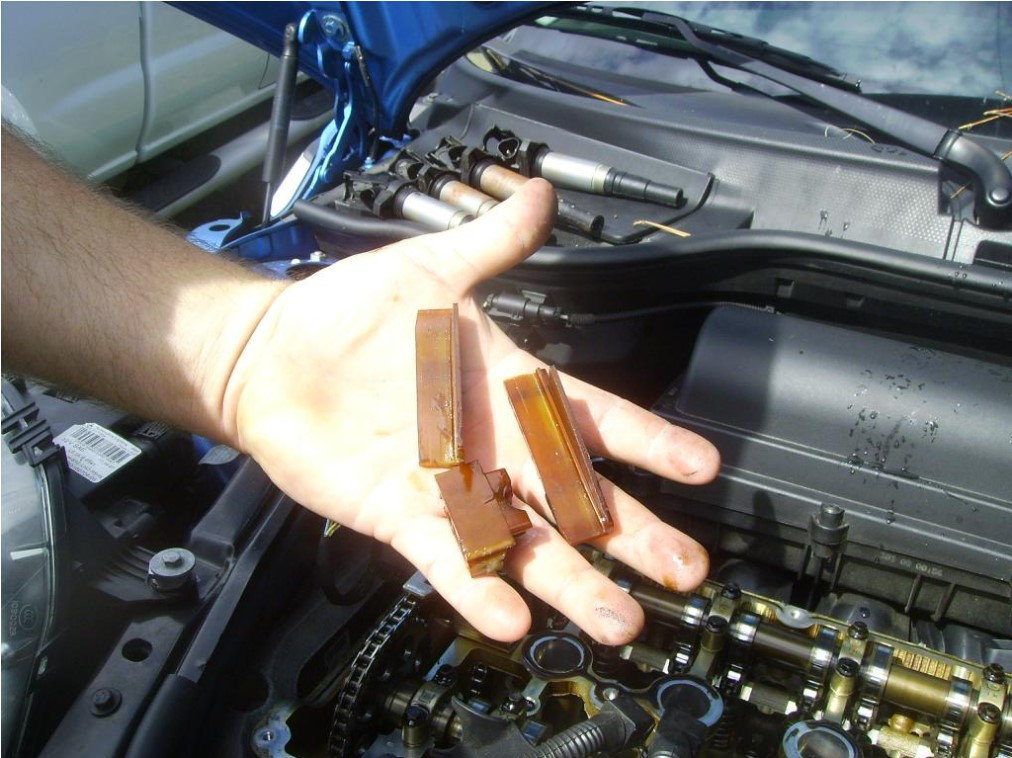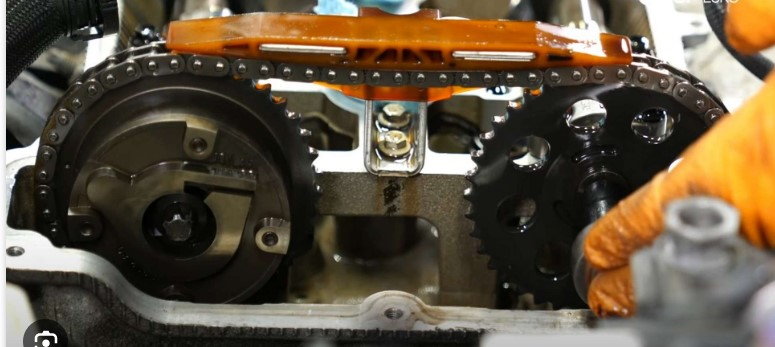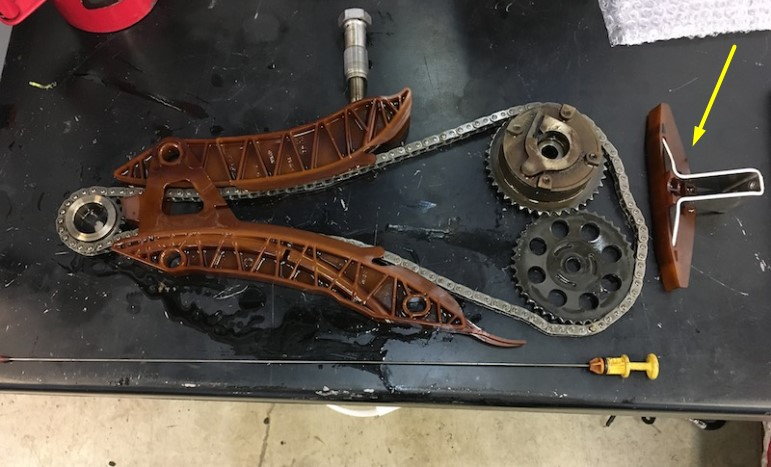R56 Timing Chain failures
#1
Timing Chain failures
What is the consensus on timing chain failures?
Peter
- Are they all caused by tensioner failures?
- Are they mostly caused by guide rail failures?
- Is there a manufacturing time frame that was problematic and later, they didn't suffer?
- What is the expected time frame for failures? 50,000 miles, or five years, or six oil changes, or one overheating cycle?
Peter
#2
Hey Peter, there are too many variables to make a hard and fast rule. You will often hear about "timing chain stretch". I actuality, the primary failure mode of timing chains is wear (wear around the pins and links). The difference between wear and stretch is one is a normal part of the chain's lifecycle, the other is where excessive tension on the chain links has exceeded the elastic limit of the chain material. Now if the wear is allowed to progress; the chain can reach the point of failure due to improper engagement between then chain and the sprockets. Insufficient oil (lubrication) in the engine is the primary cause of wear, but there are other failure mechanism, such as alignment, quality of the chain material, wear of the sprockets, quality of the sprockets etc.
Our first MINI was a 2007 justa (N12). We never had any problems with it, but at 125000 miles I decided to change the clutch and the timing chain components. This car was very well maintained, oil changed every 7500 miles, Mann filter, full synthetic oil. When I pulled the chain and measured 10 links (pin to pin under tension) the old chain was only .008" longer than the new one. That's not bad for 125K miles, and we never had any timing issues or DTCs. Remember, the job of the tensioner is to account for wear of the chain over its lifecycle.
Now take an example from the other end of the spectrum ... a car that is neglected, infrequent oil changes, allowed to run low on oil (the chain picks up oil when it reaches the bottom of its drive sprocket; that oil lubricates the joint between the pin and the link). Running with insufficient oil in the crankcase and you get wear, as wear increases, you get elongation ... what some call "chain stretch".
Now I've read about tensioner failures on this forum, but I've never experienced one. I've also seen guide failures, but that was on a BMW N20 engine. I've never seen an N series chain guide failure, but I'm sure some have experienced that problem especially with sub-standard aftermarket parts.
Another component is the sprockets, both the dive sprocket on the crank and the VANOS sprockets on the camshafts. In the case of the neglected engine, as the chain wears that will cause wear on the sprockets. If you simply change the chain, guides and tensioner, now you've put a new chain on old sprockets. The old sprockets will accelerate the wear of the new chain. This makes some think the chain is junk, but in reality, it was poor repair practice.
The other problem with your questions is, on this forum, you are going to get the experience of individual owners, and possibly some mechanics that work on a lot of MINIs; The problem with that is, their experiences are very narrow in scope when you consider the hundred of thousands of cars that were produced world-wide. Nobody is going to have complete trending data to be able to give you an empirical answer.
So how to your prolong chain life? Proper maintenance ... Follow the OEM recommended oil chain interval; use proper filtration; maintain the proper oil level between oil changes, and follow proper repair procedures using OEM or OEM supplier parts. In the case of the dreaded BMW N20 engines ... use updated guides. Early versions of that engine suffered from improperly manufactured parts (guides).
Our first MINI was a 2007 justa (N12). We never had any problems with it, but at 125000 miles I decided to change the clutch and the timing chain components. This car was very well maintained, oil changed every 7500 miles, Mann filter, full synthetic oil. When I pulled the chain and measured 10 links (pin to pin under tension) the old chain was only .008" longer than the new one. That's not bad for 125K miles, and we never had any timing issues or DTCs. Remember, the job of the tensioner is to account for wear of the chain over its lifecycle.
Now take an example from the other end of the spectrum ... a car that is neglected, infrequent oil changes, allowed to run low on oil (the chain picks up oil when it reaches the bottom of its drive sprocket; that oil lubricates the joint between the pin and the link). Running with insufficient oil in the crankcase and you get wear, as wear increases, you get elongation ... what some call "chain stretch".
Now I've read about tensioner failures on this forum, but I've never experienced one. I've also seen guide failures, but that was on a BMW N20 engine. I've never seen an N series chain guide failure, but I'm sure some have experienced that problem especially with sub-standard aftermarket parts.
Another component is the sprockets, both the dive sprocket on the crank and the VANOS sprockets on the camshafts. In the case of the neglected engine, as the chain wears that will cause wear on the sprockets. If you simply change the chain, guides and tensioner, now you've put a new chain on old sprockets. The old sprockets will accelerate the wear of the new chain. This makes some think the chain is junk, but in reality, it was poor repair practice.
The other problem with your questions is, on this forum, you are going to get the experience of individual owners, and possibly some mechanics that work on a lot of MINIs; The problem with that is, their experiences are very narrow in scope when you consider the hundred of thousands of cars that were produced world-wide. Nobody is going to have complete trending data to be able to give you an empirical answer.
So how to your prolong chain life? Proper maintenance ... Follow the OEM recommended oil chain interval; use proper filtration; maintain the proper oil level between oil changes, and follow proper repair procedures using OEM or OEM supplier parts. In the case of the dreaded BMW N20 engines ... use updated guides. Early versions of that engine suffered from improperly manufactured parts (guides).
The following users liked this post:
gauss66 (10-08-2023)
#4
There is a lot wisdom in what mkov says
Hey Peter, there are too many variables to make a hard and fast rule. You will often hear about "timing chain stretch". I actuality, the primary failure mode of timing chains is wear (wear around the pins and links). The difference between wear and stretch is one is a normal part of the chain's lifecycle, the other is where excessive tension on the chain links has exceeded the elastic limit of the chain material. Now if the wear is allowed to progress; the chain can reach the point of failure due to improper engagement between then chain and the sprockets. Insufficient oil (lubrication) in the engine is the primary cause of wear, but there are other failure mechanism, such as alignment, quality of the chain material, wear of the sprockets, quality of the sprockets etc.
Our first MINI was a 2007 justa (N12). We never had any problems with it, but at 125000 miles I decided to change the clutch and the timing chain components. This car was very well maintained, oil changed every 7500 miles, Mann filter, full synthetic oil. When I pulled the chain and measured 10 links (pin to pin under tension) the old chain was only .008" longer than the new one. That's not bad for 125K miles, and we never had any timing issues or DTCs. Remember, the job of the tensioner is to account for wear of the chain over its lifecycle.
Now take an example from the other end of the spectrum ... a car that is neglected, infrequent oil changes, allowed to run low on oil (the chain picks up oil when it reaches the bottom of its drive sprocket; that oil lubricates the joint between the pin and the link). Running with insufficient oil in the crankcase and you get wear, as wear increases, you get elongation ... what some call "chain stretch".
Now I've read about tensioner failures on this forum, but I've never experienced one. I've also seen guide failures, but that was on a BMW N20 engine. I've never seen an N series chain guide failure, but I'm sure some have experienced that problem especially with sub-standard aftermarket parts.
Another component is the sprockets, both the dive sprocket on the crank and the VANOS sprockets on the camshafts. In the case of the neglected engine, as the chain wears that will cause wear on the sprockets. If you simply change the chain, guides and tensioner, now you've put a new chain on old sprockets. The old sprockets will accelerate the wear of the new chain. This makes some think the chain is junk, but in reality, it was poor repair practice.
The other problem with your questions is, on this forum, you are going to get the experience of individual owners, and possibly some mechanics that work on a lot of MINIs; The problem with that is, their experiences are very narrow in scope when you consider the hundred of thousands of cars that were produced world-wide. Nobody is going to have complete trending data to be able to give you an empirical answer.
So how to your prolong chain life? Proper maintenance ... Follow the OEM recommended oil chain interval; use proper filtration; maintain the proper oil level between oil changes, and follow proper repair procedures using OEM or OEM supplier parts. In the case of the dreaded BMW N20 engines ... use updated guides. Early versions of that engine suffered from improperly manufactured parts (guides).
Our first MINI was a 2007 justa (N12). We never had any problems with it, but at 125000 miles I decided to change the clutch and the timing chain components. This car was very well maintained, oil changed every 7500 miles, Mann filter, full synthetic oil. When I pulled the chain and measured 10 links (pin to pin under tension) the old chain was only .008" longer than the new one. That's not bad for 125K miles, and we never had any timing issues or DTCs. Remember, the job of the tensioner is to account for wear of the chain over its lifecycle.
Now take an example from the other end of the spectrum ... a car that is neglected, infrequent oil changes, allowed to run low on oil (the chain picks up oil when it reaches the bottom of its drive sprocket; that oil lubricates the joint between the pin and the link). Running with insufficient oil in the crankcase and you get wear, as wear increases, you get elongation ... what some call "chain stretch".
Now I've read about tensioner failures on this forum, but I've never experienced one. I've also seen guide failures, but that was on a BMW N20 engine. I've never seen an N series chain guide failure, but I'm sure some have experienced that problem especially with sub-standard aftermarket parts.
Another component is the sprockets, both the dive sprocket on the crank and the VANOS sprockets on the camshafts. In the case of the neglected engine, as the chain wears that will cause wear on the sprockets. If you simply change the chain, guides and tensioner, now you've put a new chain on old sprockets. The old sprockets will accelerate the wear of the new chain. This makes some think the chain is junk, but in reality, it was poor repair practice.
The other problem with your questions is, on this forum, you are going to get the experience of individual owners, and possibly some mechanics that work on a lot of MINIs; The problem with that is, their experiences are very narrow in scope when you consider the hundred of thousands of cars that were produced world-wide. Nobody is going to have complete trending data to be able to give you an empirical answer.
So how to your prolong chain life? Proper maintenance ... Follow the OEM recommended oil chain interval; use proper filtration; maintain the proper oil level between oil changes, and follow proper repair procedures using OEM or OEM supplier parts. In the case of the dreaded BMW N20 engines ... use updated guides. Early versions of that engine suffered from improperly manufactured parts (guides).
Thread
Thread Starter
Forum
Replies
Last Post
whoinow
Stock Problems/Issues
9
12-13-2017 05:34 AM
APFabrication
R56 :: Hatch Talk (2007+)
11
07-19-2012 05:02 AM






